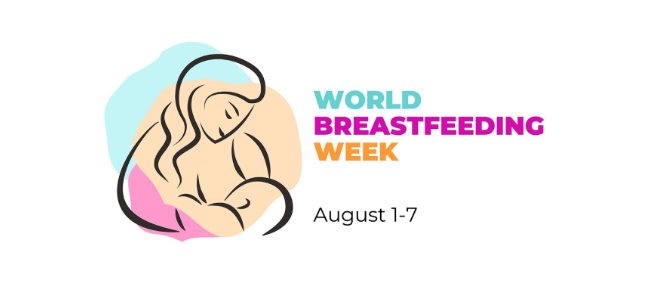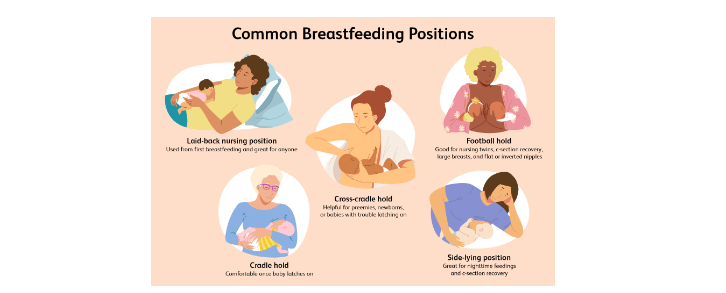By: Geraldus Sigap
World Breastfeeding Week, celebrated annually from August 1st to 7th, is a global event that underscores the vital role breastfeeding plays in nurturing healthy lives from infancy through adulthood. This week serves as a powerful reminder of the benefits breastfeeding offers to both infants and mothers, promoting awareness and action to support this natural practice worldwide. Under the theme “Closing the gap: Breastfeeding support for all,” the World Health Organization (WHO) and UNICEF emphasize the importance of ensuring that breastfeeding support is accessible to all mothers and families, regardless of their socio-economic status.

Figure 1. World Breastfeeding Week
Breastfeeding is often called a “lifelong gift” due to its profound impact on health and development. For infants, breast milk is more than just a source of nutrition; it is a comprehensive, living fluid filled with antibodies, hormones, and nutrients tailored specifically to meet a baby’s needs. During the first six months of life, exclusive breastfeeding provides all the necessary nutrients, supports healthy growth, and strengthens the immune system, thereby reducing the incidence of infectious diseases like diarrhea and pneumonia.
The benefits of breastfeeding extend beyond immediate nutritional needs. Research shows that breastfeeding can lead to better cognitive development and has been associated with higher intelligence scores in later childhood and adolescence. Additionally, breastfeeding lowers the risk of chronic conditions such as obesity, type 2 diabetes, and cardiovascular diseases later in life, laying the foundation for a healthier future.
Mothers who breastfeed also experience significant health advantages. Breastfeeding promotes faster postpartum recovery by helping the uterus return to its pre-pregnancy size and reducing postpartum bleeding. It is also linked to a lower risk of developing breast and ovarian cancers, type 2 diabetes, and postpartum depression. Furthermore, the act of breastfeeding fosters a deep emotional bond between mother and child, contributing to improved mental well-being for both.
Proper breastfeeding techniques are essential to ensure both mother and baby have a comfortable and successful breastfeeding experience. The basics include the right latch, positioning, and feeding frequency. The baby should latch onto the breast by taking a large portion of the areola into their mouth, not just the nipple, which can prevent discomfort and allow efficient milk transfer. The mother can try various positions, such as the cradle hold, football hold, or side-lying position, to find what is most comfortable for both. Additionally, feeding on demand, or whenever the baby shows signs of hunger, helps maintain an adequate milk supply and meets the baby’s nutritional needs.

Figure 2. Common breastfeeding positions
While breastfeeding offers numerous benefits, not breastfeeding can lead to several challenges and health issues for both mother and child. For mothers, one potential risk is mastitis, a painful inflammation of breast tissue that can lead to infection. Mastitis often occurs when milk is not adequately removed from the breast, either due to infrequent feeding or poor latch. Additionally, not breastfeeding may increase the risk of postpartum depression, as the hormonal changes associated with lactation can positively affect mood and stress levels.
For infants, not receiving breast milk can result in a higher likelihood of infections, as they miss out on the immune-boosting properties of breast milk. Formula-fed babies are also more prone to respiratory infections, gastrointestinal issues, and allergies.
World Breastfeeding Week is an opportunity to celebrate the progress made in promoting breastfeeding and to recognize the ongoing efforts needed to support mothers worldwide. It is a time to reflect on the importance of community and policy support in enabling mothers to breastfeed and nurture future generations effectively.
By embracing breastfeeding as a natural and essential part of human development, societies can enhance health outcomes and foster a healthier future for all. This World Breastfeeding Week, let us reaffirm our commitment to creating an environment where every mother can breastfeed freely and confidently, knowing that they are providing their child with the best possible start in life.
Resources
- Kalarikkal SM, Pfleghaar JL. Breastfeeding [Homepage on the Internet]. In: StatPearls. Treasure Island (FL): StatPearls Publishing, 2024 [cited 2024 Aug 5]; Available from: http://www.ncbi.nlm.nih.gov/books/NBK534767/
- On World Breastfeeding Week, UNICEF and WHO call for equal access to breastfeeding support [Homepage on the Internet]. [cited 2024 Aug 5];Available from: https://www.who.int/news/item/31-07-2024-on-world-breastfeeding-week–unicef-and-who-call-for-equal-access-to-breastfeeding-support
- World breastfeeding week 2023 – Newcastle Hospitals NHS Foundation Trust [Homepage on the Internet]. [cited 2024 Aug 5];Available from: https://www.newcastle-hospitals.nhs.uk/news/world-breastfeeding-week-2/
- The 5 Best Breastfeeding Positions for Different Situations [Homepage on the Internet]. Parents. [cited 2024 Aug 6];Available from: https://www.parents.com/the-top-5-breastfeeding-positions-8649820
